Photographs: Reuters
Presenting the Union Budget for 2009-10, Finance Minister Pranab Mukherjee on Monday proposed reduced customs duty on LCD TVs to 5 per cent from existing 10 per cent, making the product cheaper.
Prices of thin flat screen televisions and monitors will come down as the government lowered the basic customs duty on LCD panels used in manufacturing of such electronic goods to 5 per cent from 10 per cent.
"The electronic hardware industry has a strong potential for creating employment especially in the SME sector. I intend to reduce the basic customs duty on LCD panels from 10 per cent to five per cent to support indigenous production of LCD televisions," Finance Minister Pranab Mukherjee said while presenting the Budget 2009-10.
Besides, the government extended the exemption from full 4 per cent CVD on accessories, parts and components, that are imported for making mobile phones, by one year.
"Full exemption from CVD of 4 per cent was available to accessories, parts and components imported for the manufacture of mobile phones till June 30, 2009. I propose to reintroduce this exemption for another year," Mukherjee said.
He also announced reducing basic customs duty on permanent magnets -- a critical component for Wind Operated Electricity Generators -- to five per cent from 7.5 per cent.
"It is imperative that the contribution of new and renewable energy sources of power is enhanced if we have to successfully combat the phenomena of global warming and climate change," Mukherjee said.
What's cheaper, what's costlier
Image: Big cars may cost lessPhotographs: Rediff Archives
Additional excise duty on big cars cut
Bigger cars will be cheaper as the government on Monday reduced additional excise duty on those with engine capacities of 2,000cc and above by Rs 5,000 per unit.
It also cut the duty of petrol-driven trucks to 8 per cent from 20 per cent at present.
"In (the) case of vehicles of engine capacity below 2000cc, this component (specific duty) was Rs 15,000 per unit, while for vehicles of (a) higher engine capacity it was Rs 20,000 per unit. These rates are now being unified at the lower level of Rs 15,000 per unit," Finance Minister Pranab Mukherjee said while presenting the Budget for 2009-10 on Monday.
Excise duty on petrol-driven trucks and lorries has also been reduced to eight per cent from 20 per cent.
"Petrol-driven trucks provide a useful means of transport within cities and across short distances. These are chargeable to excise duty of 20 per cent. I propose to reduce excise duty on these trucks to eight per cent to equate the duty with similar vehicles run on diesel," Mukherjee said.
Besides, the duties on the chassis of such trucks and lorries have been reduced to 8 per cent from 20 per cent, although the fixed component of Rs 10,000 would continue to be levied.
Aiming to reduce the usage of fuel guzzlers, the government had last year imposed the fixed excise duties of Rs 15,000 for cars with an engine capacity of 1,500cc-1,999cc and Rs 20,000 for engines with 2,000cc and above. This was in addition to the already existed 20 per cent duty on such cars.
What's cheaper, what's costlier
Image: Gold prices set to rise with hike in import dutyPhotographs: Reuters
Gold prices set to rise with hike in import duty
Finance Minister Pranab Mukherjee broke hearts of fairer sex by increasing import duty on gold bars, but tried to be even handed by raising income exemption limit for women by Rs 10,000 and by exempting excise on branded jewellery.
Presenting the Union Budget 2009-10, Mukherjee announced increasing import duty on gold bars from Rs 100 per 10 gram to Rs 200 per 10 gram, while other forms of gold (excluding jewellery) is increased from Rs 250 per 10 gram to Rs 500 per 10 gram.
Gold prices rose by Rs 100 per 10 gram in the Delhi Bullion Market immediately after Mukherjee announced the decision to increase import duty.
Mukherjee, however, kept import duty on gold and silver jewellery unchanged.
The customs duty on silver has also been increased from Rs 500 per kg to Rs 1,000 per kg. The duty on gold and silver has not been reviewed since 2004 even though prices have increased manifold, the finance minister said.
He further said the revised rates would also apply to gold and silver, including ornaments that are not studded, when imported by a bonafide passenger as baggage.
Branded jewellery cheaper
On the other hand, Mukherjee announced excise duty exemption on branded jewellery. "I fear that my proposals relating to gold and silver on customs side would somewhat dent my popularity with women. I propose to salvage this by fully exempting branded jewellery from excise duty."
Gold prices touched a record 1,000 dollar per ounce in February this year, while a similar rise was seen in the domestic market with prices going up as high as Rs 15,785 per 10 gram. At present, gold prices are ruling at Rs 14,700 per 10 gram in Kolkata.
Reacting to rise in import duty, All India Sarafa (bullion) Bazar Association President Sheel Chand Jain said, "The Budget is almost flat for the bullion as the hike in customs duty would have negative impact."
He also expressed his displeasure at excise duty exemption on branded jewellery, saying there are only a handful of companies making branded jewellery and it is unlikely to benefit the people.
What's cheaper, what's costlier
Image: Duty on life saving drugs cutPhotographs: Reuters
Duties on life-saving drugs reduced
The government on Monday reduced basic customs duty on influenza vaccine and nine other specified life-saving drugs used for treating breast cancer, hepatitis-B, rheumatic arthritis, etc.
The government has also reduced basic customs duty for two bulk drugs used in manufacturing these medicines from 10 per cent to 5 per cent.
Bulk drugs are processed raw materials used in manufacturing the final doses of medicines.
"They (influenza vaccines, nine medicines and two bulk drugs) will also be totally exempt from excise duty and countervailing duty," Finance Minister Pranab Mukherjee said while presenting the Budget in the Lok Sabha.
Besides this, customs duty will also be reduced from 7.5 per cent to 5 per cent on two specified life-saving devices used in treating heart ailments, Mukherjee said.
These devices will also be fully exempt from excise duty and countervailing duty, he added.
What's cheaper, what's costlier
Image: Set-top boxes costlierPhotographs: Rediff Archives
Set top boxes to cost more
The finance minister has imposed 5 per cent customs duty on set-top boxes used for Direct-To-Home television service.
This will make set-top boxes costlier.
He also announced duty sops for green energy products like bio-fuel and generators used in environment-friendly sectors by lowering customs duty to five per cent from 7.5 per cent.
What's cheaper, what's costlier
Image: Some software packages may cost less.Photographs: Reuters
The government exempted the packaged softwares from companies like Microsoft (Windows) and Oracle (ERP) from excise duty and CVDs, which could make the prices of these softwares cheaper and affordable for small IT firms.
Experts said that broadly, the prices should fall for these software products but a lot would depend on the exact fine print of the Budget announcement.
Nasscom also welcomed the government decision to set up an alternative tax dispute addressal mechanism within the Income Tax department for foreign companies, especially in the IT sector, for the resolution of transfer pricing issues. This was a long-pending demand of the industry.
Now, CBDT would formulate safe harbour rules for these companies, as per the proposal
What's cheaper, what's costlier
Image: Mobile phone prices will remain unchanged despite incentives.Photographs: Reuters
No change in mobile phone prices
The government on Monday extended the 4 per cent countervailing duty (CVD) exemption on imported mobile accessories and components by a year, a move that would encourage manufacturing of handsets in India but not impact consumer prices.
"Full exemption from CVD of 4 per cent was available to accessories, parts and components imported for the manufacturing of mobile phones till June 30, 2009. I propose to re-introduce this exemption for another year," Finance Minister Pranab Mukherjee announced in the Budget for 2009-10.
Indian Cellular Association (ICA) President Pankaj Mahindroo said the one-year extension of exemption will not have any impact on the existing prices of mobile phones, but this would certainly boost manufacturing in India by global handset makers, besides helping Indian brands to manufacture here who are importing the phones.
Korean handset maker and number two player in India Samsung said there would be no changes in terms of end consumer prices.
India's largest mobile handset seller Nokia said the CVD exemption will continue to ensure affordable access to mobile phones and thus, drive telecom proliferation.
However, the Budget has overlooked the industry's demand to rationalise multiple taxes currently being imposed on it at both the Centre and State levels, Nokia said.

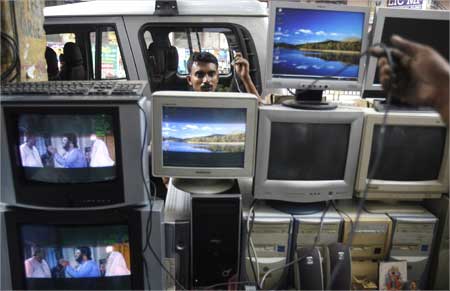
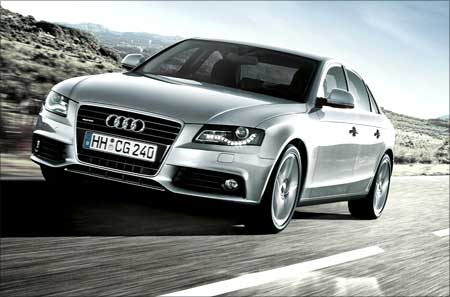
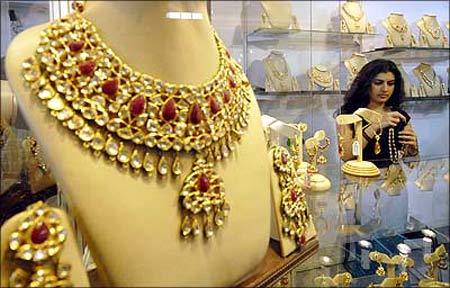
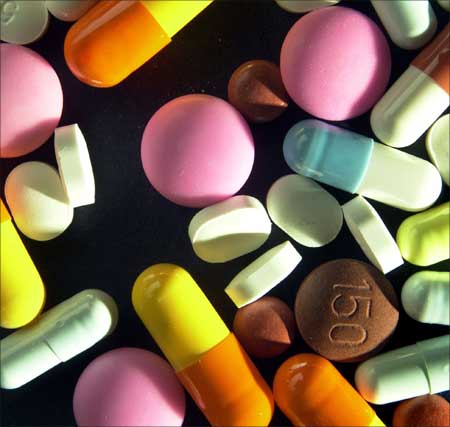
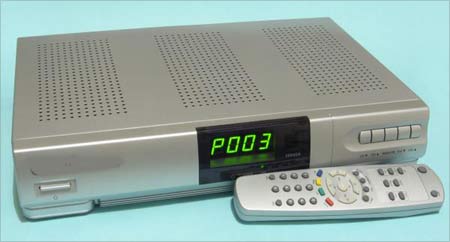
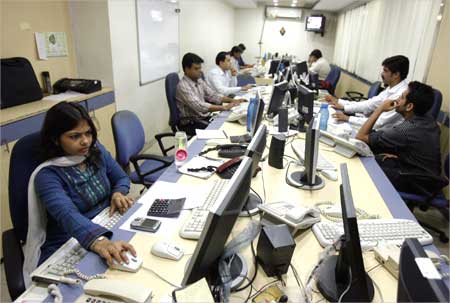

article